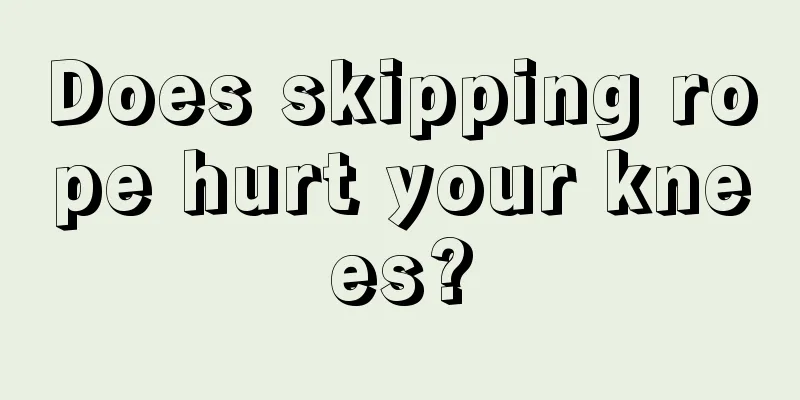Does skipping rope hurt your knees?

|
I don't know when it started, but there are endless claims that skipping rope hurts the knees, causes sagging hips, and thick calves. These claims are all incorrect. Does skipping rope hurt the knees? In fact, correct skipping rope will not pose a threat to the knees. On the contrary, it will promote the human body to become healthier and stronger. Skipping rope is a great way to exercise. People need to increase their understanding of it and avoid falling into these misunderstandings. Experts say that the impact force of skipping rope on the knees is only 1/7 of that of running, and as long as you master the skipping rope technique and land with the front end of your feet, you can reduce the impact on your body, so that your knees can be exercised while ensuring safety. Rope skipping should be done on a relatively soft surface, such as carpet, wooden floor, or flat grass. Try not to skip rope on concrete. After all, skipping rope is a longitudinal movement of the human body. The hard ground not only hurts the knee joints, but also affects the central nervous system of the brain. A reminder to all "rope lovers": "For those who are heavier, don't jump too high when skipping rope. 3 to 5 centimeters off the ground is more appropriate. At the same time, jump with both feet, which can reduce damage to the knee and ankle joints and is not easy to get tired." You need to warm up before jumping rope and relax after jumping rope. After intense rope skipping exercise, do not stop immediately. Continue to skip rope slowly or walk for a while. You can stop only after your blood circulation returns to normal. Then do some stretching and relaxing exercises to relax your leg muscles. "You need to warm up first and then relax before doing any exercise. Rope skipping can cause tension in the calf muscles, and relaxation and stretching are conducive to muscle relaxation, especially stretching exercises, which can prevent the calves from becoming thicker." Men Chuansheng said, "If you want to prevent your calves from becoming thicker, you can do some stretching exercises, or you can make fists with both hands and pat your calves. Pat each calf for 3 to 5 minutes." Does jumping rope hurt your knees? These statements are ridiculous and not worth believing at all. Skipping rope will not cause sagging buttocks. On the contrary, it will make excess fat in the buttocks disappear quickly and the buttocks muscles become firm. I hope everyone can correctly understand the importance of skipping rope and increase physical exercise in life. Skipping rope, jogging and playing ball are all great and can make our bodies healthier. |
<<: Is running good for your knees?
>>: Does running make you grow muscles?
Recommend
What are the benefits of using an exercise bike for fitness?
Nowadays, many people like to exercise. Some peop...
What are the waist and abdomen strength training methods
Waist and abdominal strength is one of the symbol...
Golf Tips
Golf is a very beneficial sport, but it is not ea...
Can doing exercises at night help you lose weight and what should you pay attention to?
Doing exercises at night is the best time of the ...
What kind of exercise can I do to reduce belly fat?
Many people feel embarrassed about the fat on the...
What are the benefits of parent-child swimming?
Parent-child swimming has been very common in our...
What is the jogging speed on a treadmill?
Many people like to use some fitness equipment to...
How to exercise the pelvic floor muscles
Why do some female friends in life have various u...
Ten minutes a day to lose weight and lose belly fat
Some people who want to lose weight are often par...
Will doing push-ups make you taller?
Many people will be anxious and worried if they d...
What are some exercises without equipment?
Many people want to exercise, but they don’t know...
What are the exercises for waist muscles?
Many people want to exercise their abdominal musc...
What is the best time to run in the morning in summer?
More and more people are running. Some people lik...
What is the best time to run at night?
Some office workers sit in the office every day a...
What are the precautions when going out hiking?
With the continuous progress of society, people p...









